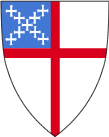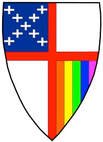|
In the Gospel this week Jesus heals a disruptive Demoniac in the Gentile area of Garasenes. Jesus has been healing others in many ways throughout the Gospel of Luke who respond with joy and thanksgiving. However when Jesus heals this “demoniac” by casting out the legion of demons into a local herd of swine, the townspeople respond with fear. When they see him clothed and with a clear mind sitting at the feet of Jesus; They ask Jesus to leave. The healed man asks Jesus if he can accompany him on the way, but Jesus instead tells the man to stay at home and share his experience with others: To tell them “all that God has done” for him.
It is not just a story about the Gospel, the Good News, being spread to the Gentile World, but it is also an allegory. There are so many symbolic things going on in this story. Historians tell us Garasenes is either a fictional town - or a misspelling of what could be a couple of different options. (Perhaps it is all of our towns.) The legion of demons is a direct reference to the Roman military. A legion would be three to six thousand soldiers. We are reminded of the Roman occupation of the area. Jesus’ ability to so easily cast them into a herd of swine expresses the knowledge of God’s reign. God holds the power the authority and the glory, not the Romans. The Legion may also represent thousands of ways in which we may delude ourselves, confuse ourselves, and participate in compulsive distractions from the true path, which is the way of peace. It is very much a societal allegory. Jesus had a way of integrating the personal and the universal for us. When the demonic man is seized by fits he is chained and bound by the townspeople. When they see him clothed and in his right mind, they are afraid. How curious… Often we respond with fear to a power greater than ourselves, even when it involves healing. Believing in a power greater than ourselves is difficult. We want to hold onto the agency we have developed over a lifetime. We’ve been trained to believe we should be able to solve all problems through our own initiative. We hold on tight to the patterns of our own thinking and doing, even when we know like St. Paul, “I do not understand my own actions. For I do not do what I want, but I do the very thing I hate.” It is difficult. We pray to God for guidance, but accepting that guidance may involve change or adaptation. The healed man has a lot of work ahead of him too. Sharing his experience, as Jesus has asked him to do, will not be easy. Will his community accept him? What will they have to accept about themselves in order to do so? We often resist the healing or transformation of others (especially in our own family) because we are so accustomed to the role that they play in our life-pattern, even if it is a disruptive role. Accepting that there is a power greater than ourselves dedicated to repair, restoration and healing (the kind of power that Jesus offers) usually means "getting out of our own way.” It means surrendering to a universal love that we know is available. We can’t totally understand, but through trust and being truly open to the experience of another, we may discover a healing that has not just occurred in them - but will help be transformative for ourselves. But beyond the very personal interpretation that we may recognize as a family systems issue… there is a more universal issue at play in the Gospel story. It involves the cliff and the swine! What is going on with the swine, and why are they driven over the cliff?! Earlier in Luke, the townspeople of Nazareth wanted to throw Jesus over a cliff when he asked them to take a good look at themselves: when he reminded them that Elijah had helped the other: the non-Jews. It was Blasphemy in their view. And to be thrown over the cliff by an angry mob was a form of execution. Yet in the Gospel today, these townspeople had never sought to execute the man who was possessed by demons. Instead he was used as a scapegoat. Such an allegorical reading of the text helps us understand why the townspeople do not rejoice to find the man healed. His possession represents all of the dark pieces hidden in the very subconscious of the people. This man loses his mind ever so often within the confines of this oppressive state. Yet, rather than recognize the violence in their culture, the townspeople use him as their scapegoat. As many of you know, on Thursday evening this week there was a shooting at an Episcopal Church in Alabama: St. Stevens in Vestavia Hills just outside of Birmingham. Twenty-five people were in attendance at a potluck supper. We don’t know the details of why, but a lone shooter was able to shoot and kill three people before he was restrained by a member of the church. We pray for the people of St. Stevens, for their friends and families, and for their community. We pray within the Body of Christ for our sisters and brothers, and we pray for a World free of violence. These shootings have become prevalent. The madness of these shooters, whether it be in Alabama, Texas, New York, Florida, Connecticut, Colorado and everywhere else in our country - are signs. They are asking us to face ourselves… asking us to consider, that as inconceivable as it is, these demonic forces are not completely divorced from the rest of us. Like the Demoniac in the Gospel, the message is clear: When we delude ourselves, when our actions are not in sync with our values, we will start to unravel: -When our leaders say, “Do as I say, not as I do”… -When we buy and sell weapons in the name of Peace. -When we model violence in so many of our forums, yet aver we are about peace and liberty and equality for all - it will, and it has manifested itself in depression, addiction, mental illness, and violence. It is inconceivable on the one hand to feel connected to the gun violence in our midst, as inconceivable as it is for the towns people to feel connected to the Demoniac. Like the Demoniac, the sins of our community are partly to blame for the sins of such possessed individuals. Haul him out constrained and shackled - So much easier than looking at the mechanisms of society. Seeing him seated, clothed and in his right mind? That requires a powerful healing and requires the community to face themselves. This is why Jesus asks him to stay: so the community can begin the healing work at home. St. Paul said, “I do not understand my own actions. For I do not do what I want, but I do the very thing I hate.” Healing begins at the local level. We know that. Over the last three and a half months I have been reminded daily that the people of this parish find support and healing in one another even as you are binding your own wounds. That is the definition of Christian. Jesus wants the victim to help convert his community. It is part of a long tradition of the “wounded healer.” It’s part of your story and part of every Christian’s story because it is part of the resurrection story. The Demoniac’s healing foreshadows Jesus’s role in conquering sin and death. And the sins of the community go over the cliff. Jesus overturns the scapegoat mechanism in rising from the dead. Jesus gives us the Very God who identifies with the marginalized and the victim, who confronts violence in all of its forms. As Christins we not only stand as a healing place where "hate has no home here. " We stand as a healing reminder to one another and the community that no violence of any kind has a home here. God, Bless us with you wisdom! and God Bless this country.
0 Comments
Leave a Reply. |
AuthorThe Rev. Heather K. Sisk Archives
July 2024
Categories |
We Would Love to Have You Visit Soon!
WE ARE ALL MADE IN THE IMAGE OF GOD |
Telephone845-635-2854
|
|
 RSS Feed
RSS Feed

